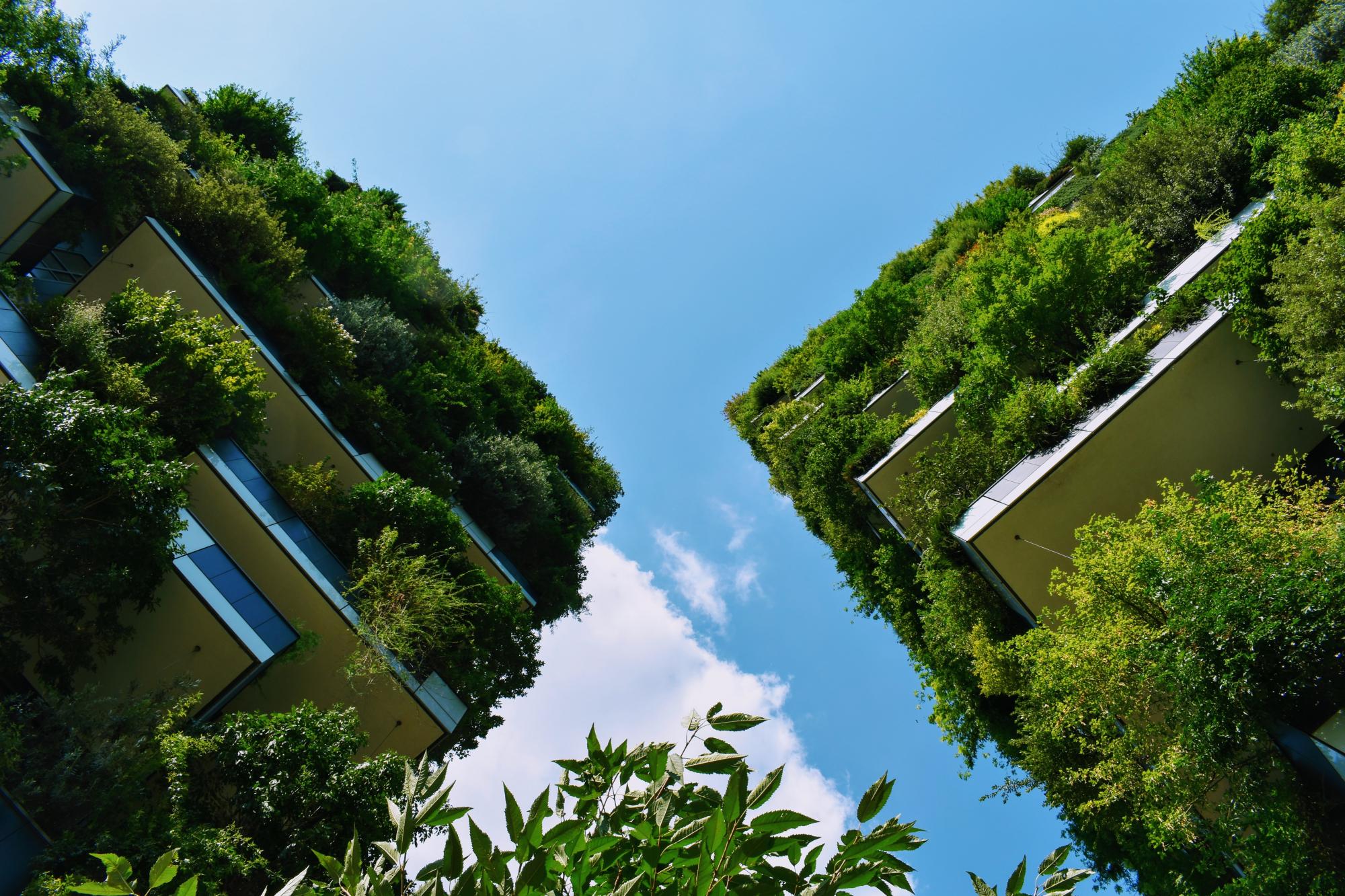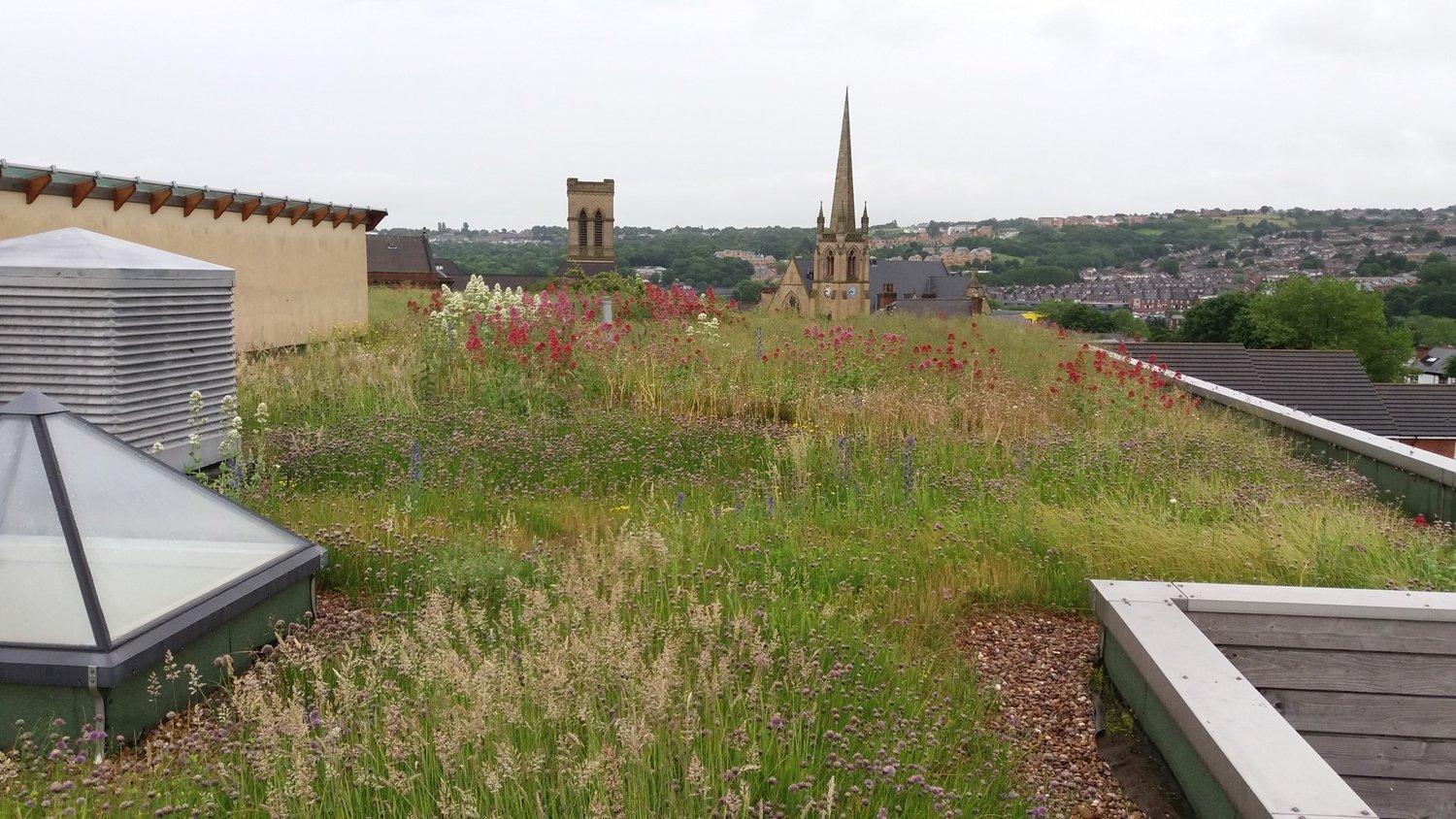Last updated: October 2021
The 2,044 square meters green roof on Sharrow School in Sheffield is designed to reflect the different habitats surrounding the city and includes a wildflower meadow and grassland plants as well as a wetland area with a small pond. The aim of the green roof was to provide added value by assisting the control of stormwater, humidity, noise, heat and pollution. It has been declared as a Local Nature Reserve by Sheffield City Council with the support of Natural England, in recognition of the importance of the roof to wildlife and educating the school's pupils about nature and the environment.[1][2]
Overview
Nature-based solution
- Nature on buildings (external)
- Green roofs
Key challenges
- Water management (SDG 6)
- Stormwater and rainfall management and storage
- Green space, habitats and biodiversity (SDG 15)
- Green space creation and/or management
- Environmental quality
- Air quality improvement
- Noise reduction
- Regeneration, land-use and urban development
- Promote natural styles of landscape design for urban development
Focus
Creation of new green areas
Project objectives
The aim of the green roofs was to provide added value by assisting the control of stormwater, humidity, noise, heat and pollution. It is also used as a learning resource with curriculum-friendly uses for all the children.[1][3]
Implementation activities
The key design goal for the roof was to create plantings with dramatic visual impact for much of the year, high biodiversity value, and minimal resource and maintenance requirements. Almost 700 plants were planted by volunteers from within the community. The green roof was designed with different vegetation types to provide a range of habitats for invertebrate and bird species. This was achieved in a number of ways, including the use of a variety of substrates to create varied soil conditions that promote the establishment of different plant communities. Plants were largely allowed to colonize naturally, and some seed mixes were specifically introduced to benefit pollinators in particular. Green Estate has been undertaking regular ongoing maintenance at Sharrow School for the last six years. Maintenance tasks are carried out with the aim of optimizing the health of the vegetation and maintain the individual habitats. [1][4]
Main beneficiaries
- Public sector institution (e.g. school or hospital)
- Young people and children
Governance
Management set-up
- Co-governance with government and non-government actors
Type of initiating organisation
- Public sector institution
- Researchers/university
Participatory approaches/ community involvement
- Joint implementation (e.g. tree planting)
Details on the roles of the organisations involved in the project
The roof was built on the new Sharrow Primary School which was born out of the amalgamation of Sharrow Infant and Nursery School and Sharrow Junior School following a review of schools in the Sharrow, Abbeydale and Heeley areas identified an oversupply of school paces for the number of children needing them. The investor and architect of the green roof were the Sheffield City Council who contracted Malden Roofing Contractors for the installation. Its design came from the Green Roof Centre. [2][5]
It is one of 120 green roofs in Sheffield, which claims to be the ''green roof capital'' of the UK, and was designed by the Green Roof Centre which was founded by Sheffield University and Groundwork Sheffield. [2]
Project implemented in response to ...
... an EU policy or strategy?
Unknown
... a national policy or strategy?
Unknown
... a local policy or strategy?
Unknown
Financing
Total cost
Unknown
Source(s) of funding
- Public local authority budget
Type of funding
- Direct funding (grants, subsidies, or self-financed projects by private entities)
Non-financial contribution
Type of non-financial contribution
- Provision of labour
Who provided the non-financial contribution?
- Citizens (e.g. volunteering)
Impacts and Monitoring
Environmental impacts
- Climate change
- Lowered local temperature
- Environmental quality
- Improved air quality
- Green space and habitat
- Increased green space area
- Increased number of species present
Economic impacts
- Unknown
Socio-cultural impacts
- Education
- Increased support for education and scientific research
Type of reported impacts
Expected impacts, Achieved impacts
Presence of formal monitoring system
Yes
Presence of indicators used in reporting
Yes
Presence of monitoring/ evaluation reports
No evidence in public records
Availability of a web-based monitoring tool
No evidence in public records
References
1] Source link. 2018. Sharrow Primary School - Source link. [online] Available at: <Source link [Accessed 8 August 2020].
[2] Source link. 2009. School First With Rooftop Nature Reserve. [online] Available at: <Source link [Accessed 8 August 2020].
[3] Source link. 2020. School Roof Declared A Nature Reserve - Bauder. [online] Available at: <Source link [Accessed 8 August 2020].
[4] Green Estate Landscapes. 2020. Sharrow School - Green Estate Landscapes. [online] Available at: <Source link [Accessed 8 August 2020].
[5] Source link. 2009. Sharrow Primary School - Green Roof System Case Study - Bauder. [online] Available at: <Source link [Accessed 8 August 2020].
[6] Source link. 2009. Sharrow Primary School. [online] Available at: <Source link [Accessed 8 August 2020].
[7] Source link. 2011. Bauder Green Roof On Sharrow Primary School Declared A Local Nature Reserve. [online] Available at: <Source link [Accessed 8 August 2020].
[2] Source link. 2009. School First With Rooftop Nature Reserve. [online] Available at: <Source link [Accessed 8 August 2020].
[3] Source link. 2020. School Roof Declared A Nature Reserve - Bauder. [online] Available at: <Source link [Accessed 8 August 2020].
[4] Green Estate Landscapes. 2020. Sharrow School - Green Estate Landscapes. [online] Available at: <Source link [Accessed 8 August 2020].
[5] Source link. 2009. Sharrow Primary School - Green Roof System Case Study - Bauder. [online] Available at: <Source link [Accessed 8 August 2020].
[6] Source link. 2009. Sharrow Primary School. [online] Available at: <Source link [Accessed 8 August 2020].
[7] Source link. 2011. Bauder Green Roof On Sharrow Primary School Declared A Local Nature Reserve. [online] Available at: <Source link [Accessed 8 August 2020].

